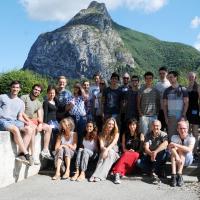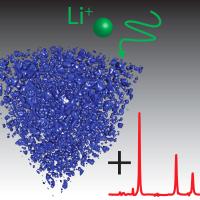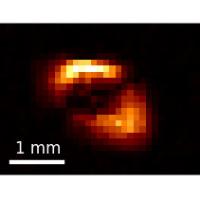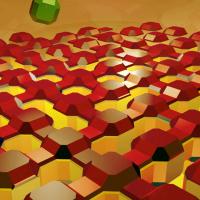 Operando experiments at beamline ID31 revealed an important link between structural defects in PtNi/C nanoparticles and an enhancement of the kinetics of the oxygen reduction reaction. Subsequently, by designing structural disorder into the system, a new class of catalyst has been developed with performance comparable to the best shape and composition controlled nanocatalysts but with higher stability.
Operando experiments at beamline ID31 revealed an important link between structural defects in PtNi/C nanoparticles and an enhancement of the kinetics of the oxygen reduction reaction. Subsequently, by designing structural disorder into the system, a new class of catalyst has been developed with performance comparable to the best shape and composition controlled nanocatalysts but with higher stability.
Continue Reading
 An international collaboration has unveiled the mechanisms of the crucial process of signalling through membrane receptors.
An international collaboration has unveiled the mechanisms of the crucial process of signalling through membrane receptors.
Continue Reading
 Shape Memory Alloys (SMAs) are metals that “remember” their original shape and go back to it when they are deformed. Their multiple applications go from medical devices, orthodontic material or automobile and aeronautics components. French scientists are studying what happens in their microstructure when they stretch.
Shape Memory Alloys (SMAs) are metals that “remember” their original shape and go back to it when they are deformed. Their multiple applications go from medical devices, orthodontic material or automobile and aeronautics components. French scientists are studying what happens in their microstructure when they stretch.
Continue Reading
 The ESRF/ILL International Student Summer Programme is helping students to take one step nearer to their dreams. Viktor Radermacher has blisters on his hands but a huge smile on his face. The blisters are from carrying the 8kg case containing a precious dinosaur fossil all the way from South Africa, the smile because it’s the first time away from his home country and he’s living the dream that has inhabited him since the age of 2. He is, at last, working with dinosaurs. In fact, he is using the most advanced techniques available to palaeontologists today to scan fossils using the ESRF’s ultra bright X-rays.
The ESRF/ILL International Student Summer Programme is helping students to take one step nearer to their dreams. Viktor Radermacher has blisters on his hands but a huge smile on his face. The blisters are from carrying the 8kg case containing a precious dinosaur fossil all the way from South Africa, the smile because it’s the first time away from his home country and he’s living the dream that has inhabited him since the age of 2. He is, at last, working with dinosaurs. In fact, he is using the most advanced techniques available to palaeontologists today to scan fossils using the ESRF’s ultra bright X-rays.
Continue Reading
 Operando X-ray tomographic microscopy (SRXTM) and scanning X-ray diffraction (SXRD) have been combined for the first time to study dynamic processes in a lithium ion battery. This combination of techniques allowed the lithiation processes to be tracked throughout the electrodes on different length scales: the dynamic distribution of crystallographic phases was analysed using SXRD, while SRXTM data was used to probe volumetric changes and understand the interplay of different kinetic limitations.
Operando X-ray tomographic microscopy (SRXTM) and scanning X-ray diffraction (SXRD) have been combined for the first time to study dynamic processes in a lithium ion battery. This combination of techniques allowed the lithiation processes to be tracked throughout the electrodes on different length scales: the dynamic distribution of crystallographic phases was analysed using SXRD, while SRXTM data was used to probe volumetric changes and understand the interplay of different kinetic limitations.
Continue Reading
 Operando experiments at beamline ID31 revealed an important link between structural defects in PtNi/C nanoparticles and an enhancement of the kinetics of the oxygen reduction reaction. Subsequently, by designing structural disorder into the system, a new class of catalyst has been developed with performance comparable to the best shape and composition controlled nanocatalysts but with higher stability.
Operando experiments at beamline ID31 revealed an important link between structural defects in PtNi/C nanoparticles and an enhancement of the kinetics of the oxygen reduction reaction. Subsequently, by designing structural disorder into the system, a new class of catalyst has been developed with performance comparable to the best shape and composition controlled nanocatalysts but with higher stability.
 English
English  Русский
Русский  An international collaboration has unveiled the mechanisms of the crucial process of signalling through membrane receptors.
An international collaboration has unveiled the mechanisms of the crucial process of signalling through membrane receptors. Shape Memory Alloys (SMAs) are metals that “remember” their original shape and go back to it when they are deformed. Their multiple applications go from medical devices, orthodontic material or automobile and aeronautics components. French scientists are studying what happens in their microstructure when they stretch.
Shape Memory Alloys (SMAs) are metals that “remember” their original shape and go back to it when they are deformed. Their multiple applications go from medical devices, orthodontic material or automobile and aeronautics components. French scientists are studying what happens in their microstructure when they stretch. The ESRF/ILL International Student Summer Programme is helping students to take one step nearer to their dreams. Viktor Radermacher has blisters on his hands but a huge smile on his face. The blisters are from carrying the 8kg case containing a precious dinosaur fossil all the way from South Africa, the smile because it’s the first time away from his home country and he’s living the dream that has inhabited him since the age of 2. He is, at last, working with dinosaurs. In fact, he is using the most advanced techniques available to palaeontologists today to scan fossils using the ESRF’s ultra bright X-rays.
The ESRF/ILL International Student Summer Programme is helping students to take one step nearer to their dreams. Viktor Radermacher has blisters on his hands but a huge smile on his face. The blisters are from carrying the 8kg case containing a precious dinosaur fossil all the way from South Africa, the smile because it’s the first time away from his home country and he’s living the dream that has inhabited him since the age of 2. He is, at last, working with dinosaurs. In fact, he is using the most advanced techniques available to palaeontologists today to scan fossils using the ESRF’s ultra bright X-rays. Operando X-ray tomographic microscopy (SRXTM) and scanning X-ray diffraction (SXRD) have been combined for the first time to study dynamic processes in a lithium ion battery. This combination of techniques allowed the lithiation processes to be tracked throughout the electrodes on different length scales: the dynamic distribution of crystallographic phases was analysed using SXRD, while SRXTM data was used to probe volumetric changes and understand the interplay of different kinetic limitations.
Operando X-ray tomographic microscopy (SRXTM) and scanning X-ray diffraction (SXRD) have been combined for the first time to study dynamic processes in a lithium ion battery. This combination of techniques allowed the lithiation processes to be tracked throughout the electrodes on different length scales: the dynamic distribution of crystallographic phases was analysed using SXRD, while SRXTM data was used to probe volumetric changes and understand the interplay of different kinetic limitations. In the global battle against cancer, the scientific community is looking into efficient solutions to effectively destroy cancer cells without harming healthy ones. A team of researchers from the University of Applied Sciences in Darmstadt (Germany), the Université de Lorraine (France) and the pharmaceutical corporation MERCK are developing new ways of separating cancerous from healthy blood cells.
In the global battle against cancer, the scientific community is looking into efficient solutions to effectively destroy cancer cells without harming healthy ones. A team of researchers from the University of Applied Sciences in Darmstadt (Germany), the Université de Lorraine (France) and the pharmaceutical corporation MERCK are developing new ways of separating cancerous from healthy blood cells. Nanoscale beams are essential for the direct imaging of nanoscale objects. However, producing suitable nanoscale X-ray beams is a significant engineering challenge. With a new multilayer mirror system, beamline ID16A now provides routine imaging on the nanoscale with a sub 13 nm high-energy X-ray beam. This is a world first.
Nanoscale beams are essential for the direct imaging of nanoscale objects. However, producing suitable nanoscale X-ray beams is a significant engineering challenge. With a new multilayer mirror system, beamline ID16A now provides routine imaging on the nanoscale with a sub 13 nm high-energy X-ray beam. This is a world first. Magnetic refrigeration is based on the magnetocaloric effect, which is associated with the temperature change of a material when placed in a magnetic field. X-ray techniques and DFT calculations were used to investigate the first-order magnetoelastic transitions of Fe2P-based materials. The electron density was studied across the transition and a distinct charge redistribution around the Fe atoms at the ferromagnetic transition was found for the paramagnetic state which deforms the unit cell. DFT calculations show a simultaneous decrease in the magnetic moment of Fe, indicating that there is competition between the magnetic moment and covalent bonding.
Magnetic refrigeration is based on the magnetocaloric effect, which is associated with the temperature change of a material when placed in a magnetic field. X-ray techniques and DFT calculations were used to investigate the first-order magnetoelastic transitions of Fe2P-based materials. The electron density was studied across the transition and a distinct charge redistribution around the Fe atoms at the ferromagnetic transition was found for the paramagnetic state which deforms the unit cell. DFT calculations show a simultaneous decrease in the magnetic moment of Fe, indicating that there is competition between the magnetic moment and covalent bonding. Ghost imaging is an indirect method in which most of the X-rays used for the experiment never actually interact with the sample. The first demonstration of X-ray ghost imaging has been carried out at beamline ID19. The method uses two copies of the same speckled beam and the image is retrieved indirectly by correlating the two measured signals. This experiment could lead to the development of low-dose medical X-ray diagnostics and diffraction-imaging at free electron lasers.
Ghost imaging is an indirect method in which most of the X-rays used for the experiment never actually interact with the sample. The first demonstration of X-ray ghost imaging has been carried out at beamline ID19. The method uses two copies of the same speckled beam and the image is retrieved indirectly by correlating the two measured signals. This experiment could lead to the development of low-dose medical X-ray diagnostics and diffraction-imaging at free electron lasers. Two-dimensional systems have recently emerged as very promising candidates for future electronic devices. An ordered 2D array of nanocrystals can be created by letting nanocrystals self-assemble and connect at a liquid surface. This new structure shows excellent long range order on both the nanocrystal and atomic level. Experiments at beamline ID10 revealed how the nanocrystals order themselves and ‘click together’ to produce beautiful 2D superlattices.
Two-dimensional systems have recently emerged as very promising candidates for future electronic devices. An ordered 2D array of nanocrystals can be created by letting nanocrystals self-assemble and connect at a liquid surface. This new structure shows excellent long range order on both the nanocrystal and atomic level. Experiments at beamline ID10 revealed how the nanocrystals order themselves and ‘click together’ to produce beautiful 2D superlattices.